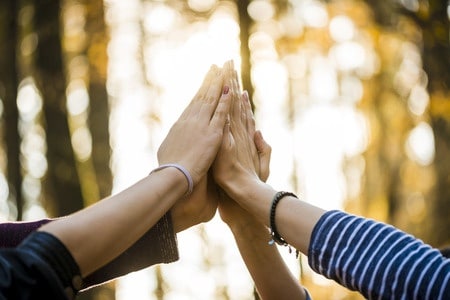by Megan McDonough
A nation divided creates disconnected camps, each vying for the title of “right and good” versus “wrong and bad.” There are people in my neighborhood—and even in my own family—who voted differently than I did in this US election. The divide became even more tangible to me when a student at Wholebeing Institute sent me an e-mail, saying that what we offer with positive psychology is a cover-up. In her words, “Positive psychology is unable to fix election damage.”
Is positive psychology a sham? Or can disconnected camps become a community connected?
I’ve been quiet this election season. In part because I find the vitriol between the camps poisonous. But mostly because I need to be clear in my own head and heart before I write down words for you to read. That means solitude, at least for a while.
At some point, true connection demands conversation. So I’m writing this to you because serving in any any community means sharing thoughts with others, in constructive dialogue.
Here are my thoughts, which I hope become an open invitation to share yours, even (especially) if you see things differently.
I’m noticing how I use language that divides. Whenever I say “them” out loud or to myself, I’m building a wall of separation. You’re either in my camp, a part of “us,” or you’re not. Words create worlds. The experiment I’ve been playing with is omitting “them” from my election-related vocabulary. It’s not easy.
I have incredible freedom. I can write these words, speak my own truth, and take meaningful action. In that freedom lies great responsibility. I choose to wield that freedom in a way that aims towards the highest and best. This election has strengthened and fortified my commitment to that vision, personally and for Wholebeing Institute. I’m so grateful to have work that teaches and encourages me to reach for the ideal every day.
I’m responsible for aligning my values and actions. I see a paradox when liberals espouse the value of tolerance, yet are intolerant in words, actions, or attitude towards Trump and his supporters. I see a paradox when conservatives espouse the value of a less invasive government, protecting the individual right to bear arms, yet seek legislation that intrudes on a woman’s body. It’s easier to see where others fall short of alignment, but can I recognize the paradoxes in my own espoused values versus actual actions? This is tough work. It’s a big mountain to climb; I never reach the top.
I harness the creative power of chaos to hold the whole. From the destruction of Athens after the Persian War came architecture that we revere today. After the bubonic plague, the Renaissance was born. I’m not saying the election is anywhere near that magnitude (although for some it may feel that way). What I am wondering is this: In what way does the election chaos set the stage for creative good? If, like yin and yang, nothing is ever all good or all bad and always contains elements of both, what balanced view of the whole is most helpful to hold? This tempers the tendency for winners to gloat and losers to despair. Holding the whole acknowledges the wisdom of building bridges.
I learn from everyone. I am in awe of Trump’s ability to manifest his reality in the face of impossible odds. How does he do that? What can I observe and learn? I so admire Hillary’s poise and passion in the face of bitter disappointment. How does she do that? What can I observe and learn? This human experience is malleable. I can shape who I want to be, and learn from everyone.
I practice courageous conversations. Gulp. This one is most difficult for me. Conflict and debate are not things I enjoy. Yet speaking out at the Thanksgiving table or reaching out to a dissenting neighbor crystallizes my thinking. My attitude and values play out in real life, shaping who I become. I’m more comfortable with reflective solitude for deep thinking; heartfelt words about differing views are scarier. Standing in my truth by speaking my truth feels a whole lot more vulnerable than sitting on a meditation cushion. I’m not quite sure what that will look like over the coming days, months, and years. It’s a work in progress.
These reflections come out of my practice of yoga and positive psychology—two disparate sciences that align in many ways (and diverge in others). They are not shams; neither are they a panacea for creating an idealized nirvana. They do, however, offer valuable guideposts for living well, even in difficult times.
What about you? What words of wisdom can you share that create connection during a time of deep division? What practices—in positive psychology, yoga, or otherwise—are you engaging in to help bring your community together?
Even closer to home, when we sit around the Thanksgiving table, how do we connect in real and meaningful ways—acknowledging differences, honoring values, and aiming towards depth rather than division?
Megan McDonough is CEO of Wholebeing Institute, an educational organization co-founded with Dr. Tal Ben-Shahar. WBI is committed to spreading ideas and practices that can help individuals and groups live life to its fullest.
Click here for a course listing.










